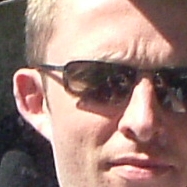It’s been a while since I last updated this blog but on browsing the internet, I found the following article which brought to mind something I have in the past tried to explain: how do I draw?
The article is by Jonathan Jones, the Guardian newspaper’s art critic in which he describes after years spent dissecting the works of the great artists, how and why he decided to put his money where his mouth was - and learn to draw. While the notion of someone being an art critic yet being unable to draw is somewhat confounding, I think he should be respected for trying.
Why, after all, is drawing - or any any art - still so relevant to the world in an age of photography? Jonathan Jones realises that: “Picasso has taught me something about the way we experience the world. All the time, we deny life’s complexity in order to get on with things. A drawing can at least acknowledge this by acknowledging its partiality of viewpoint.” A photograph is a record of what was seen but a drawing, a painting, a sculpture can be so much more about what was felt. Art is about decisions and choices: what is to be included in the representation and what is to be abandoned that we might make sense of things?
A while back, I realised that a perfectly analogy for this might be for you to imagine looking into a stream of clear-running water on a spring day. Barefoot, you stand upon polished pebbles: now pick out the one pebble that best captures the way the coolness of the water, the light upon its surface or the feeling of ‘aliveness’ from being stood there in that exact moment makes you feel. Choosing which would be the one stone to capture all these feelings is just as difficult as choosing which is the ‘right’ line to add to the paper. It is not so easy as it looks.
Jonathan Jones’ article in full:
It's not as easy as it looks
Thursday, March 30, 2006
Sunday, January 22, 2006
And as if by magic...
...appeared. That’s 2 out of 4 in the planned series. It felt really good to paint this one and feelings are the key to this picture (as they were with the first one too) as opposed to any reasoned statement about the world, human affairs and blah blah blah.
Still, I did start in my usual way with a black canvas and then with a white chalk pencil, ‘carved up’ the canvas into sectors, marking out key compositional elements. To say that the picture then ‘painted itself’ simply wouldn’t be true: as with any other painting, most of the work is done before a single dab of paint touches the canvas.
It’s all in the mind you see...
Wednesday, January 18, 2006
The first painting of the new year...
 ...was done in a bit of a rush (technical term, ‘alla prima’ which does not, as you might imagine mean ‘all in one go’ but instead ‘bloomin’ heck’).
...was done in a bit of a rush (technical term, ‘alla prima’ which does not, as you might imagine mean ‘all in one go’ but instead ‘bloomin’ heck’).Anyway, it’s my day off work today and as busy as things have been this month, I was determined to squeeze in some painting at some time this month so I thought, ‘Why not?’... 5 hours later, I have me some pre-stretched canvas 36” x 36” with some paint on it. I might touch it up a bit later and put it on sale.
Oh, this is the first time that I’ve been reasonably successful at painting a ‘chap’, so I reckon I might crack open a tinnie to celebrate.
Ideas for a title should be submitted via the comments tab below.
Saturday, January 14, 2006
We zijn niet te versmaden
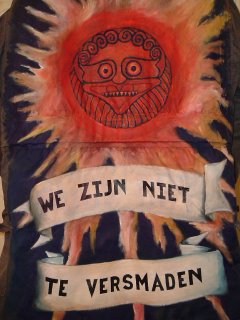 I have an amazing winter coat that must be twenty years old. It dates from the time that I was in the Air Training Corps - between those difficult years of 16 and 17 when I was still thinking of joining the Royal Air Force. As the old army kit that we were supposed to wear for ‘field craft’ was never the right size, the cadets would swap kit whenever someone had a better size. The old kit was whatever we could find in the Army & Navy stores. I swapped a regular field jacket for this amazing piece of kit. A Norwegian friend at university told me that it was a bit of kit issued to the Norwegian forces (folk are - or were - conscripted at 18 and had to return for more training and exercises throughout their lives up to 55, I think) which perhaps explains the exceptional quality. The coat is stuffed with down feathers and has a fur-lined (I know, I know but the animal was dead already...) hood. It can easily cope with cold northern winds of a winter Scotland.
I have an amazing winter coat that must be twenty years old. It dates from the time that I was in the Air Training Corps - between those difficult years of 16 and 17 when I was still thinking of joining the Royal Air Force. As the old army kit that we were supposed to wear for ‘field craft’ was never the right size, the cadets would swap kit whenever someone had a better size. The old kit was whatever we could find in the Army & Navy stores. I swapped a regular field jacket for this amazing piece of kit. A Norwegian friend at university told me that it was a bit of kit issued to the Norwegian forces (folk are - or were - conscripted at 18 and had to return for more training and exercises throughout their lives up to 55, I think) which perhaps explains the exceptional quality. The coat is stuffed with down feathers and has a fur-lined (I know, I know but the animal was dead already...) hood. It can easily cope with cold northern winds of a winter Scotland.However, in a moment of madness at university, I daubed a ‘Straight Edge’ motto on the back. Ostensibly, it was a celebration of the DIY ethic that underlies all good contemporary ‘garage’ punk (and we’re talking bands like Fugazi, Black Flag and the like and most definitely not MTV-style snot-lite Green Day, The Strokes et al. The motto: “Fuck Art Let’s Slam” made sense then but 14 years later is just a little embarrassing.
Being the sort of person who aspires to see opportunities in the negative things encountered in life, I decided to paint over the old motto and enhance the colours of the original image.
The snarling face/ sun pattern is based on an ancient Macedonian shield pattern. The Macedonians, under Alexander, gave the Persians a kicking that still affects Middle East politics to this day (in terms of it being an East vs. West thing) but at the time, there was a massive exchange of ideas and philosophy. On India’s western shores, for instance, there is a community of Jewish people who still practice the beliefs of their forebears who arrived with Alexander’s army more than two thousand years ago. The West discovered Buddhism - and Hinduism - for the first time (The Beatles, or rather George Harrison, were not the first) and also, crucially for modern mathematics and physics, the concept of zero. The arch, as deployed in stone bridges etc., was also brought back from Persia. In the interests of political stability in the newly conquered realm, Alexander also forced his officers to marry local women and settle in what was then a very foreign place. There was no ‘exit strategy’.
The motto itself is Dutch and is courtesy of Toon Tellegen’s stories about V.Swchrwm. Kristine and I began translating some of Tellegen’s stories over the New Year but one of my favourite’s remains the story of how the little boy, V.Swchrwm (don’t worry, the name makes no more sense in Dutch either) is spurned. The story, for me, is about turning something negative into a positive. As heartening as the message was, we wrote to Toon Tellegen to ask if we could translate his work and try and get it published in English and almost as an after-thought, Kristine changed V.Swchrwm’s words into the motto:
We will not be spurned.
Thursday, January 12, 2006
No pen, no pencil, no paint...
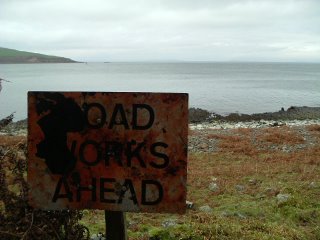 ...no brushes, no canvas, no paper, nothing but some time on my hands.
...no brushes, no canvas, no paper, nothing but some time on my hands.I haven't updated the blog in a while as I've been away over the New Year, spending some time with Kristine on Holy Isle (you can see more about the island by clicking here).
All kinds of gubbins gets washed up on the beaches ringing Holy Isle as it sits just off the Ayrshire coast. Along with the remains of three urchin shells (eaten by sea otters), cormorant skull, sheep skeleton, myriad other shells and natural stuff was this road sign.
With a camera in my pocket, I had a chance for some fun with the unspoilt Scottish landscape...
As for what I did with all the other stuff, well... I made a sort of memorial, if you will, for the poor wee beasties that get forgotten but which are an inseperable part of the island's beauty. After I left, Kristine hung that in the old cemetary that is still there on the island but I expect that the next storm will break it apart and send the bits and pieces back to where it came from.
I had a great time. Holy Isle is well worth a visit if you haven't been yet.
Sunday, December 11, 2005
Sometimes...
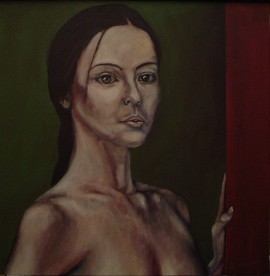 ...a painting just doesn’t work at all.
...a painting just doesn’t work at all.Quite a few of my paintings have several paintings under them. It’s quite an amusing thought that maybe one day, some academic with too much funding and curiosity may take an X-Ray to the paintings to discover what lies beneath them. (I know, me and my friend Ego...) When a painting doesn’t work, I’ll continue working on it in the hope that just a little something may make that all important difference and sometimes I’ll just stop and without a moment of hesitation, simply cover the lot with black primer.
I’m still trying to figure out exactly what I did - or didn’t do - that the painting did not turn out as planned.
I’m not even going to bother naming this one.
Sunday, December 04, 2005
Recommended
 I was asked what I used as source material for my paintings. Rather than write out by hand those books I have used (and can remember using), I thought I could add the details to the blog and add to it as I get one of those ‘Oh yeah, I remember now...’ moments. By some considerable distance, the best photographic reference for the human body (once you are familiar with the anatomy of muscle groups), is the one shown above: Howard Schatz' Nude Body Nude.
I was asked what I used as source material for my paintings. Rather than write out by hand those books I have used (and can remember using), I thought I could add the details to the blog and add to it as I get one of those ‘Oh yeah, I remember now...’ moments. By some considerable distance, the best photographic reference for the human body (once you are familiar with the anatomy of muscle groups), is the one shown above: Howard Schatz' Nude Body Nude.Dorling Kindersley (now part of the not-funny joke that is Penguin Books) have also produced a good book by the artist Sarah Simblet. The photographs in that case are by John Davis, most famous perhaps for photographing the Australian Olympic team of Sydney 2000 in the nude. This is your best bet as the second-hand copies of Howard Schatz’ books are worth hundreds of pounds (or dollars). No wonder. And, no, you can’t have my copy.
As I work during the daylight hours as a bookseller, I also get asked for recommendations on good books to read for fun. I could go on and on about the great stuff I’ve read over the years; after all, it’s one reason why I still take home naff-all pay. Alongside art, books are a real passion. So, if you’re after something good to read, then look to the menu bar on the right. I’ve tried to choose a real mix of books including literary, crime, short story collections, stories for children/ young adults and a couple of horror novels. The best way to approach any of the books - as with life - is with an open mind. With this in mind, I haven’t listed the categories the books would usually be filed under in a shop or library.
Here’s how the selection works:
PS. This is going to sound ungrateful but if ever it crosses your mind to present a book to me as gift, please don’t. I have run out of ways to hide my embarrassment at being given something I’ve rubbished at work. If I haven’t discovered a book in ten years of bookselling that I’m going to like then I have been doing something wrong: either I have read the book or I have bought it and it’s on the pile of books to be read or, it hasn’t been published yet.
PPS. Think about it: would you give a spare tyre to a guy who drove buses for a living?
Saturday, December 03, 2005
True Adventures
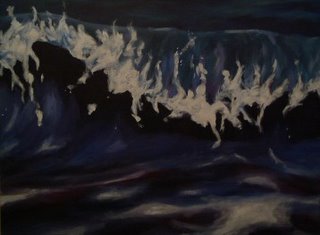 True Adventures, 40” x 30”, December 2005, Acrylic on canvas
True Adventures, 40” x 30”, December 2005, Acrylic on canvasfrom Kenneth White’s poem, Walking the Coast
who has not observed it
the primal movement
the play of wind on water
the undulation
the glassy membrane
lifted
excited
and energised
by insisting air
the curving
the deliberate inflection
the flurry of whiteness
the bright cast of spray
the long falling rush
and the hundredfold ripple
The above quotation is from the book, ‘The Bird Path: Selected Longer Poems’.
Kenneth White is relatively unknown in Britain but has been awarded some of France’s most prestigious literary prizes, including the Prix Medicis Etranger (1983) and the French Academy’s Grand Prix du Rayonnement (1985) for the entire body of his work.
Kenneth White writes in English - not French. His work is now out-of-print in the UK (and US) but is still available in translation in German, Greek, Spanish, Bulgarian, Dutch and so on and so on.
Friday, December 02, 2005
First public showing!
 Sometimes, the best news is The Best simply because it is so unexpected and so it was yesterday. I’ve been offered a considerable amount of space to display my paintings. If you live in - or near - West Sussex then have a mosey on down to Worthing for the day (it’s that rather nice town you’re planning on retiring to, just down the coast from Brighton) and check out Methvens Booksellers on South Street. From sometime next week, hopefully, you’ll be able to see my paintings.
Sometimes, the best news is The Best simply because it is so unexpected and so it was yesterday. I’ve been offered a considerable amount of space to display my paintings. If you live in - or near - West Sussex then have a mosey on down to Worthing for the day (it’s that rather nice town you’re planning on retiring to, just down the coast from Brighton) and check out Methvens Booksellers on South Street. From sometime next week, hopefully, you’ll be able to see my paintings.A big thank you to the MD, Alan Clifford, for the offer...
...going back to the internet gallery, the re-coded and revised version of the website is now up and running including a nifty stat counter. All of which has been done in the space of this morning. Even the web standard tags and meta names - all individually referring to the content - at the top of each page have been re-coded this morning. Phew! I had a freak the day before yesterday when I saw my website attemting to load on a creaking old PC running Windows Explorer 5.5... words failed me at the time.
To everything, there is a time and place. That is as diplomatic as I can be now but what the flarty are Microsoft thinking? Even the current version of Explorer is far from Standards compliant. So, to repeat: if you wish to see my website as it was designed to look, then use Firefox. Blah blah blah...
...I hear a chorus at the back from the fraternity of Steve Jobs’ girlfriends. No, Macs cost a lot of money and that’s just for the lawyers in the ‘Nano’ debacle. But hey! It looks nice. Designer scratches? Lovely.
Wednesday, November 30, 2005
Inspiration
 It's not always about what you intend, it's about what you let happen...
It's not always about what you intend, it's about what you let happen...This is an ‘old’ shot taken on my last holiday to the Isle of Arran. My mum and me (I know, grammatically, I should write ‘I but it sounds too posh) had been in conversation as we walked around the grounds of Brodick Castle. We came around the corner of a low terrace of bungalows and chanced upon a flight (if that's the right word) of butterflies settled upon these unknown flowers. In the time it took me to set up my camera, most of the butterflies caught the August breeze and flitted away. Only one remained behind to give me what remains one of my favourite photographs ever.
I get asked where I find inspiration for the things I paint. Find is exactly the right word as I don’t ever go looking for ideas. On those occasions I have actively sought out the ‘right’ picture, the painting has never worked. I try to find that one single moment when a special some-thing shows itself for the briefest instant. The trick, if there is one, is to turn this into a habit: give space to everything and everyone and you will find those special moments.
It was on this holiday that I also found someone special. Her name is Kristine.
Tuesday, November 29, 2005
Nick Cave (alla prima)
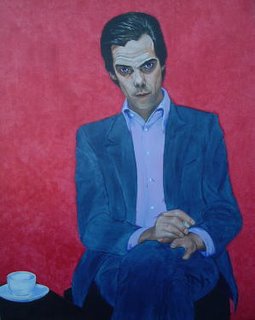 Nick Cave (alla prima), 40“ x 50”, sometime 2003, Acrylic on canvas
Nick Cave (alla prima), 40“ x 50”, sometime 2003, Acrylic on canvasThis is an ‘old’ painting that seems to have been kicking around forever.
If memory serves, this picture was painted sometime in summer of 2003 and was based on a composite of 3 or 4 photographs. At the time, I was not yet painting in the chiaroscuro style, hence the lighter background. The apparent ‘lightness’ of the painting exists for another reason: there’s only one coat of paint over most of the canvas and so the white ground or ‘primer’ shows through really clear.
The painting is quite large but believe it or not, was relatively quick to paint... all of 6 hours. Most of my attention was focused on getting the face - and the lighting of the face - exactly as I wanted it. I was inspired, I guess. It was a monster session of coffee, cigarettes (I was smoking then but no longer) and repeated listenings of the album, Nocturama. Only later did I learn that creating a picture all-in-one-go like that is called alla prima. I haven’t done anything like it since and this picture stills hangs pride-of-place at work. It’s a sort of cultural-intelligence test: some visitors, perhaps because I work in a ‘bookish’ environment, think that the portrait depicts Martin Amis. Most visitors, however, do guess correctly and so this picture passes what I think is the true test of a portrait (at least for beginners) .ie. does it look like the person you were trying to paint?
Monday, November 28, 2005
PicturesandStories.co.uk ver2.0 is now live!
 There have been a few ‘tweaks’ made to the original version of the site: gone are the photographs; gone are the massive picture files; gone too are the fictional characters who populated the site.
There have been a few ‘tweaks’ made to the original version of the site: gone are the photographs; gone are the massive picture files; gone too are the fictional characters who populated the site. When designing the site and writing the code, I hadn’'t realized that so many people still used so-called ‘dial-up’ connections and neither had I appreciated just how often BT phonelines (in the UK) inexplicably slow d o w n... so that even a ‘dial-up’ connection can seem whizzy compared to broadband. Anyway, if you want a larger version of a picture file, you can ask me directly: the e-mail is listed on the homepage where - I hope - it’s easiest to find. However, what you won’t find is some nifty CGI-program that allows you to click on a link and e-mail me that way: until Spam is canned, SpamBots will have to look elsewhere for addresses to harvest.
Hopefully, even folks using the most primitive Microsoft browsers (what am I saying? All Microsoft product is primitive) should be able to view the site in crystal clarity. Of course, Firefox is best of all but y’all knew that already being Bloggeratti, right?
Pictures and Stories was coded in simple HTML and CSS2. The graphics were processed using ULead PhotoImpact 6.0. For those of you thinking of creating your own page, might I recommend using Terrapin software to upload your site? No, I haven’t been paid to give a recommendation (the full version cost me £19.95) but it made the whole process of getting a website up on the internet so painless (after I'd learned how to code HTML), I thought it deserved a free “plug” (Terrapin FTP actually checks your site for “bugs”. I’m down to 4 for the whole site, so I must be doing something right).
Wednesday, November 23, 2005
Souvenirs of Spring

Sometimes nothing can compare to a very simple pencil-and-paper sketch. This is the wasabi, the pickled ginger between courses of the painter's world. It is always good, no matter what you do in life, to go back to where you began. It is a 'cleansing of the palette' for whatever comes next.
I've been listening to - and enjoying - Black Rebel Motorcycle Club's Howl.
Saturday, November 12, 2005
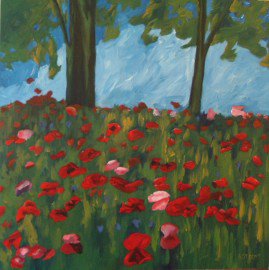 Poppy Bight, 36" x 36", October 2005, Acrylic on canvas, £600
Poppy Bight, 36" x 36", October 2005, Acrylic on canvas, £600A return to landscape painting but using a square canvas. The difficulty here is not in the process of painting or the perspective but composition. A single subject or abstract image can fill a square canvas without too much thought and yet remain quite dynamic. A landscape has many elements competing for the viewer's gaze.
I interrupted the cool tones of the background with some windblown poppy petals in 'cooled' red tones. I was mindful of the angle of the brushstrokes and their relative length, ignoring the urge to blend the colours more carefully or introduce more detail. This is me painting 'happy' with big blobs of colour and lots of abandon.
 Papa Won't Leave You, Henry, November 2005, 16" x 20", Oil pastel on paper, £100
Papa Won't Leave You, Henry, November 2005, 16" x 20", Oil pastel on paper, £100Sometimes it's just plain fun to grab some crayons and really go for it. This is a horse but not as you might have seen them before (see below). Energy and the depiction of life were key to the exercise here as I try to 'push the envelope' on my skills. I have found that trying to approach a familiar subject in a new way can dramatically improve my understanding of techniques I already use and in a painterly sense, how the colours work together.
 Vigil, 24" x 24", June 2005, Not for sale
Vigil, 24" x 24", June 2005, Not for saleA period of waiting, watching. Anticipation and hope are signal feelings here but also melancholy and despair. The horse is depicted without even the cast of a highlight in it's gaze to represent an inward gaze: meditation and prayer. Faith.
The horse is depicted with a 'dressed' mane: it is dressed in its finest as it waits. The horse could be a descendent of of those depicted in Greco-Roman sculpture. It could also be in a certain stable on a certain evening. Standing in darkness, the mute animal knows there is always hope.
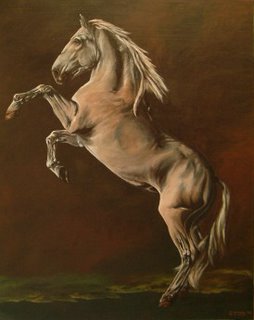 The Silence of death, 40" x 50", October 2004, Acrylic on canvas, Not for sale
The Silence of death, 40" x 50", October 2004, Acrylic on canvas, Not for saleThe moment when you cross the last threshold: the ticking of the clock sounding like the stamping of heavy hooves, the distant snorting of a mighty beast, running toward you, now rearing before the hooves stamp down one last time. In painting this picture, I wished to summon in the viewer's mind the portrait, Napolean Bonaparte Crossing the Alps by the Great Saint Bernard Pass - 1800 by Jacques-Louis David (click here to see it) and idealized proportions of the unreal horse.
In David's painting, Bonaparte is off to conquer another country. More death. It's a war and in the words of a famous person, 'stuff happens'. It does.
As with all the other paintings that (will) form part of the planned series, there is no detail in this picture apart from the subject. Death induces feelings of claustrophobia: there is no room at the moment for anything else.
 Communion, 36" x 36", December 2004, Acrylic on canvas, Not for sale
Communion, 36" x 36", December 2004, Acrylic on canvas, Not for saleOf all the paintings I've created, this is the one about which I am most proud and the one which I'm sure will attract the most opprobrium.
Christians are used to thinking of bread and wine as Flesh and Blood and between the many branches of the Christian tradition there are many ways of understanding the receiving of - or participation in - the Act of Communion. Some believe that wine and bread are only symbols; others believe that the wine and bread are translated into blood and flesh; while yet others believe that the wine and bread physically become that part of God which was given at The Last Supper.
In this painting, I am attempting to depict the feeling of what it is like to partake in the Act of Communion. Communion is first and foremast a spiritual act in which we are called upon to acknowledge our part in our wider humanity, our relationship to God and to our community and in which we examine our purpose for being as we remember. It is a moment for awakening to a dream of something greater than ourselves. There is the moment of hesitation when we surrender notions of self.
Blood is also symbolic of love and of sacrifice. The skin of the depicted woman is deliberately shifted toward a death-like tone (as in Lazarene below which has tones suggesting the return to life) to suggest complete acceptance, the abandoning of everything known. Key to the Act of Communion is the sense in which we give to others, to God and to life itself. Even if we are repulsed by the sight of blood - especially our own - our fascination of blood and the life it perpetuates continues through many aspects of our lives. Many religions have regulations on how we must treat blood. Where there are regulations, we observe that the restrictions most severely affect women and their bodies attempting an impossible divide between those who nature has given the power to produce life and the signs of vitality. Beyond any religious reference in this painting, a woman is at the moment of reconcilition between herself and her own body.
This painting (and Lazarene) are the paintings which depict the interior life of the spiritual person: dreams, meditation, contemplation and the sensuality of actually living.
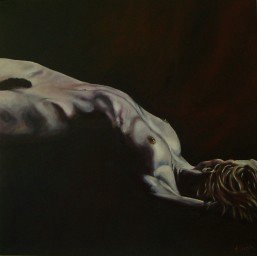 Lazarene, 36" x 36", June 2005, Acrylic on Canvas, Not for sale
Lazarene, 36" x 36", June 2005, Acrylic on Canvas, Not for saleThe greatest miracle Jesus performed was the raising of Lazarus. It is a story which has always fascinated me, being so full of potency and the power that exists in the giving of life itself. To raise someone from the dead is an extraordinary revelation of divine attributes and which would likely have sealed Jesus' fate in the eyes of the priests. There is nothing we fear more than death not even pain as it is a threshold we must cross absolutely alone.
I am fascinated by the talents of Renaissance painters of whom there is no one comparable today. One painter stands out in front of all others, even over da Vinci, in the depiction of the Christian story and that must be Caravaggio. Click here to see how Caravaggio depicts the raising of Lazarus.
Centuries before the invention of the box camera, there were human beings able to depict the range of Human experience from the most base and vulgar to the most glorious depiction of The Divine. It takes more than an unmade bed or a pickled cow and calf to be an 'artist'. Being able to hold a paintbrush and a pencil are a good start. We are nothing if we do not lift our heads to look at the stars and the profane Caravaggio, an artist who drank prodigiously, fought and brawled - even murdered - knew more of the Sacred than a clutch of of conmen who stand as pygmies among the giants of the Renaissance.
In painting Lazarene, I was not looking for the public miracle but that quiet moment when the born again ask themselves if it can be true, if it truly can be more than a dream. The 'Lazarene' is naked because we are naked before God and before the person we truly are. Nothing is hidden.
 God Moving Over The Face of the Water - Holy Island, 36" x 36", January 2005, Acrylic on canvas, £3,500
God Moving Over The Face of the Water - Holy Island, 36" x 36", January 2005, Acrylic on canvas, £3,500Sometimes, inspiration comes unexpectedly. A sudden shift of the tide reflecting light in a different way that reveals something of the world around us, an unplanned journey that leads to new friends, a revelation of one's place in life and the world and the immensity of that which we know and love as our home.
There are some experiences that defy explanation and sometimes we have to go beyond mere words.
Subscribe to:
Posts (Atom)

